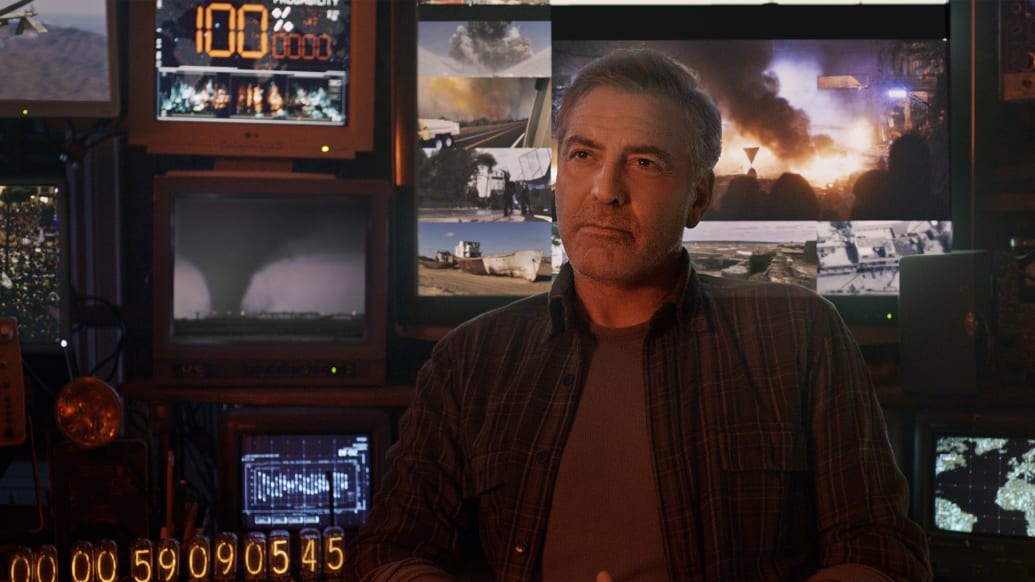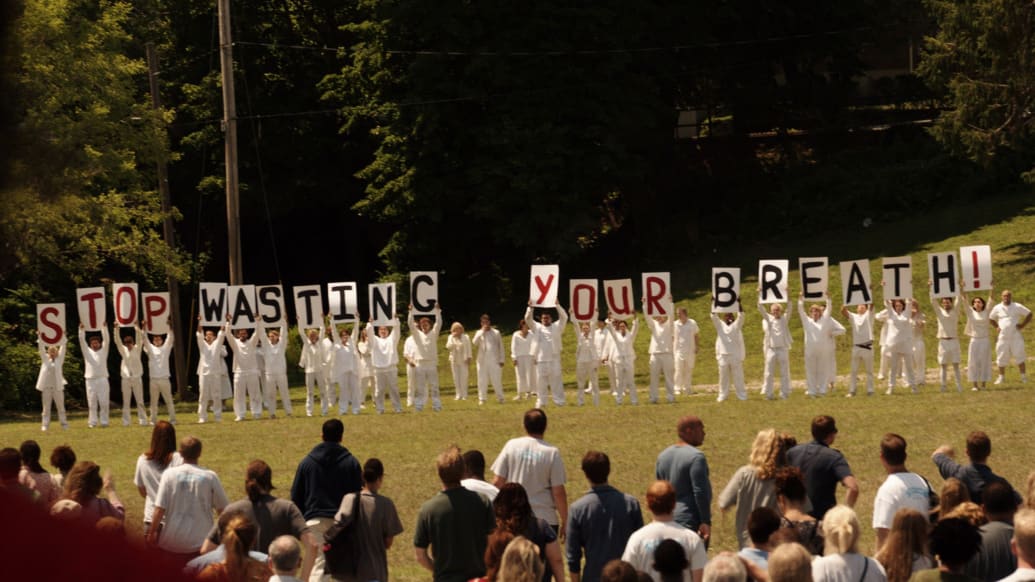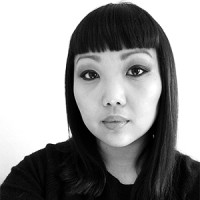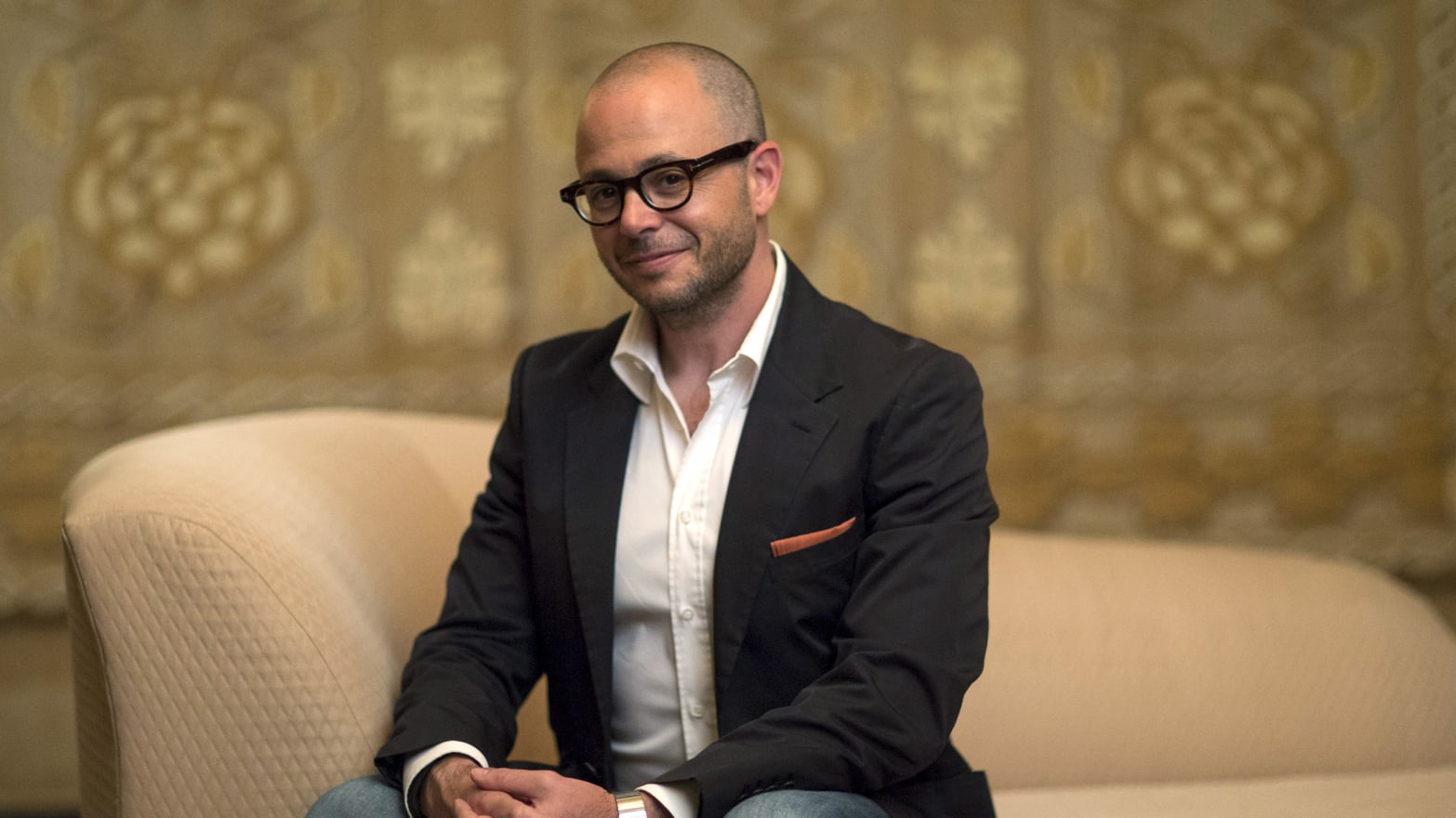In the year and a half that Tomorrowland co-writer Damon Lindelof has been off Twitter, he’s been a much happier person for it. “I couldn’t resist knowing what everybody was saying about me and it just ended up making me feel bad,” admits Lindelof, who still endures his share of outrage over Lost even though it’s been half a decade since the head-twisting show sent fans grumbling into their message boards.
Ignoring the haters is a lesson Lindelof has now poured into Tomorrowland, the sincere-to-a-fault, $190 million sci-fi mystery from Disney based on Walt’s most ambitious vision of a better tomorrow: a futuristic utopia built on the kind of optimism and belief in progress that America could afford to dream of during the Space Age.
Directed by Pixar veteran Brad Bird, Tomorrowland stars Britt Robertson as Casey, the wide-eyed science whiz daughter of a NASA engineer. She finds herself the Chosen One when a spunky android in the body of a 12-year-old girl gifts her a pin with the power to glimpse Tomorrowland, an inter-dimensional scientific Shangri-La where the best minds of humankind were recruited to make the future bright.
George Clooney plays a once-hopeful inventor whose spirit was crushed after a childhood odyssey to Tomorrowland. He now spends his days sealed off from the world, counting down the hours to the apocalypse as a bank of monitors tracks every breaking broadcast catastrophe.
Nowadays, inundated as we are with a 24-hour news cycle of war, sickness, disaster, famine, drought, Ebola, Kimye, and other assorted harbingers of Armageddon, there’s little room left for optimism. And so Tomorrowland wears its heart on its sleeve, encouraging the creatives of the world with a simple, earnest lesson: Keep on keepin’ on. Dust yourself off and try again. Don’t stop believing.
Tomorrowland also sends a twofold message to bureaucrats, politicians, the media, and haters in a time when we’re constantly inundated with doomsday scenarios: Leave these poor hopeful souls alone and the human race might have a shot.
If that sounds awfully naïve, Lindelof is well aware. He’s so used to shouldering attacks from his critics for everything from Lost to Prometheus to Star Trek: Into Darkness, he warned Bird before they took on Tomorrowland that The Lindelof Effect could bring more scrutiny than usual.
Critics are unsurprisingly split over Tomorrowland, particularly because it hits the save-the-world soapbox so hard. That unsinkable spirit is also what’s endeared it to its champions. As Lindelof chatted with The Daily Beast about Tomorrowland, cynics, Joss Whedon’s Twitter exit, One Direction drama, and other urgent concerns plaguing the modern optimist, he was already bracing for impact.
Tomorrowland is clearly meant to inspire the dreamer out there who might be the one to find a cure for cancer or solve global warming, but it also declares that media-induced cynicism is humanity’s real enemy. Whose behavior are you trying to impact the most?
Our hope is obviously that the movie can be for anyone… but there are individuals, and I count myself as one of them, who used to be very hopeful and have started to become kind of cynical, have started to calcify. It’s so easy to be infected by cynicism. It’s so easy to be mean. It’s so easy to tell somebody who is a dreamer, “Come on, really?” And when you see their face when you do that to them, there’s no worse feeling in the world than understanding that you’ve just unintentionally crushed someone’s dream.
It’s saying something that in Tomorrowland George Clooney isn’t the hero who’s saving the world, but the one who needs saving.
It’s reaching out to someone who is just about to become a hardened cynic, because once you become a hardened cynic, there’s no going back. Saying, “You’re holed up in your house just waiting for the end of days, but I’m going to come knock on your door and say, ‘Get out of your house,’ because I know there’s a part of you that once said there was a much brighter future. But we have to do something about it! We can’t just sit here idly by, we have to activate, it’s going to be hard work, we’re going to have to risk our necks, there are going to be people out there trying to hurt us, but let’s rally around us.” I’m making the movie for them.
You called up EW critic Jeff Jensen to help flesh out the story for Tomorrowland. Do you find it ironic that to write this story about defying the naysayers, you teamed up with a writer who’d thoroughly criticized your work on Lost?
Jensen, he’s so much more than a critic. I mean, aren’t we all critics now? When I was on Twitter, if I said something mean, the play that it would get, the amount of favorites and retweets, was like 50 times what it would be if I said something nice. The fact is that critics are called critics—they’re not called cheerleaders. They’re basically there to assess material that’s put in front of them. So if you’re a professional critic your job is to go in and find the flaws in something.
Is that still how you view the role of critics and their value in the sphere of art and entertainment?
It’s what I think, and it’s what I want. I kind of feel like in The Incredibles, when Bob says, “We shouldn’t just give trophies to everyone, otherwise the trophies are meaningless.” If every single review I read of Tomorrowland was like, “I’m going to be honest with you, they really put a lot of hard work into this thing. We liked it!” If every single review said that and everything on Rotten Tomatoes is 100 percent, then reviews mean nothing. So there needs to be critical discourse out there in order to have something to triumph over. That said, I do think that there is a meanness on occasion in some quarters that is absolutely unnecessary. You can assess the relative value of something without saying, you know, “Reese Witherspoon should never ever be in a comedy again.” It’s like, “Fuck you!”
Well, she really should not be in a comedy like Hot Pursuit again.
I want to see Reese Witherspoon in a comedy! Sometimes you’re gonna hit, and sometimes you’re gonna miss, and the difference between the two is razor thin. That’s sort of the nature of the beast. Everybody can’t be Kubrick and say, “I’m only going to make one movie every nine years.” You’ve got to stick your neck out. But I kinda get it.

You recently renewed your TV deal with Warner Bros. to come back for another season of The Leftovers, another kind of doomsday tale. Some speculate that you’re cooking up a return to network television. What are your immediate TV plans?
To be completely honest, my deal was up and I had an incredible experience working with the people there and I wanted to do a couple more seasons of The Leftovers, if they let me. That’s really all the deal covers. But I’m not opposed to doing broadcast again. When I’m done with the second season of Leftovers we can talk about what else is out there. I say no to nothing but I’m also looking forward to being monogamous with just one creative idea.
How will the critical and fan response to the first season affect the changes you make for Season 2?
We shot the first season in New York and we’re shooting the second season in Austin, Texas. Most people sign up for a second season of television and they say it’s going to be the same people that I know and love in the same place that I found them last year. But some of the television that I love, The Wire for example, was never afraid to move the lens of the storytelling to a different place. Maybe The Leftovers would benefit from something like that.
As someone who sticks your neck out in your projects that already tease these big mysterious payoffs, do you think you got more flak because you involved yourself in the social conversation and made yourself more of a target?
Interestingly enough, in their defense, I think my Twitter persona was just a magnified aspect of who I believe myself to be. Which is that I’m self-deprecating, I’m insecure, I’m not always sure, I feel lucky to be here… these are all legitimate things. So if I say I screwed up, or I’m a fucking idiot, or I could’ve done better that time—if I’m taking shots at myself, I’m inviting people to go, “If Lindelof is doing it to himself, that invites me to do it to him.” And also, I put way too much thought into crafting clever tweets. It was like, “Wait a minute, shouldn’t I be working right now?” It’s a job.
Those faves are addictive. They fuel a real craving for validation and voyeuristic hunger for other people’s drama.
That’s right. It feels powerful when you say something that a lot of people respond to, and it is a little bit of a light side/dark side thing where the dark side is just much more, “Oh my god, you’re starting a feud with someone!” I’m not on Twitter any more, but I’m still in the pop culture sphere. So I know this one guy left One Direction, and now I know that he’s feuding with another member of One Direction? It’s broken through into the pop culture sphere—I go on Uproxx and it’s there! Well, I go on Uproxx because I care about genre movies and television, but why are they saying this? They wouldn’t be saying anything about these two if they were saying nice things about each other.
Joss Whedon also recently, publicly, quit Twitter after enduring a ton of snark and hate over Avengers 2, and after making tweets critical of other films that he then apologized publicly for.
Good for him! I’m a much happier and well-balanced person for being off of Twitter. I’m not saying Twitter is an evil place. I had a lot of fun while I was there.

Tomorrowland similarly tells the children of the future to ignore those voices trying to stamp out any sense of optimism that we’ve collectively given in these self-fulfilling prophecies. How do you fight that when we live in a world in which it’s almost impossible to keep the blinders on?
The fact is that cynicism is actually not a bad thing; it’s a healthy thing. Because if you walk through the world being optimistic and hopeful about everything you’d just get crushed left and right all the time. That’s just not the way that things work. Finding the balance between, “How can I be hopeful, but not be an idiot?” is immensely difficult. I think we were trying to toe that line. Casey as a character is the one person in the classroom who puts her hand up and asks, “How do we fix this?” You think, how is that not corny? How do you not look at that character and say, “Come on.” It’s a very slippery slope in terms of making it feel like it’s real and admirable as opposed to naïve.
Were you worried about coming off too Pollyanna-ish with a protagonist who’s so unrelentingly chipper?
Understanding obviously that Brad [Bird] has a tremendous amount of goodwill, I said to him, “Look, I desperately want you to make this movie because collaborating with you would be a dream come true. That said, I want to tell you before you get involved with me that my name on anything has a cachet, and not necessarily in the best way.” Particularly as it regards mystery storytelling or ambiguous storytelling. There are people who are gunning for me on general principle. I wanted him to be aware of that. But his response, and I’m paraphrasing, was, “Fuck them—I want to do this anyway!” I thought, that’s the spirit. That’s how this isn’t going to feel Pollyanna-ish.
We go into this thing eyes wide open and fully resign ourselves to the fact that some people are going to respond to this movie by rolling their eyes. Then there will be other people who’ll be like, cool. You just can’t please everybody. But you can’t be afraid of the eye-rollers. You can’t let them dictate to you what you can or cannot do.
So even off of Twitter, you’re clearly aware of how the Damon Lindelof brand of storytelling plays with your haters. Have you ever thought, maybe this time… no ambiguity, no mystery box?
It’s so hard because it probably should deter me from doing that stuff, but at the end of the day my type is my type. It’s sort of the equivalent of saying, “Damon, you always fall for really tough, blond Catholic girls, and every time you go out with one it just ends poorly.” It’s like, yup! And tomorrow night I’m going out on a date with a tough, blond Catholic girl. That’s just what floats my boat, that’s what turns me on. And by the way, I’m now married to one and it’s working out pretty well so far.
You found the right one.
I found the right one! But the reality is, I’m going to tell the stories that are engaging to me and there is probably a safer story to tell out there… Nash Bridges was the first show I wrote for, and I wrote for a show called Crossing Jordan. I know that I can go write a TV show that’s just a good, old-fashioned procedural where every episode there’s a little mystery and they solve it, and that’s that. But it wasn’t enough for me. I’d rather play in this more dangerous space, where people are going to say, “Oh, fuck you with the ambiguity.”
But I also think that ambiguity is interesting and I wanted to make a Disney movie that made people think. Whether we accomplished that or not is in the eye of the beholder, but I’m proud of it, and I don’t think I could have gotten Bird and George involved if it didn’t have some substance to it. Or as Brad says, “It needed to have vegetables.” Broccoli’s good for you. You don’t always want to eat it, but if you put it on a plate with some other good stuff maybe people will like it.

